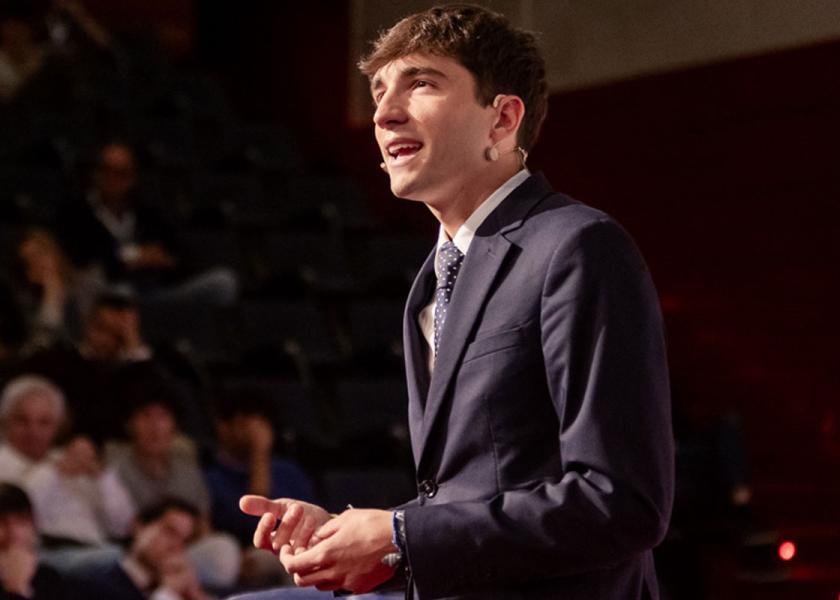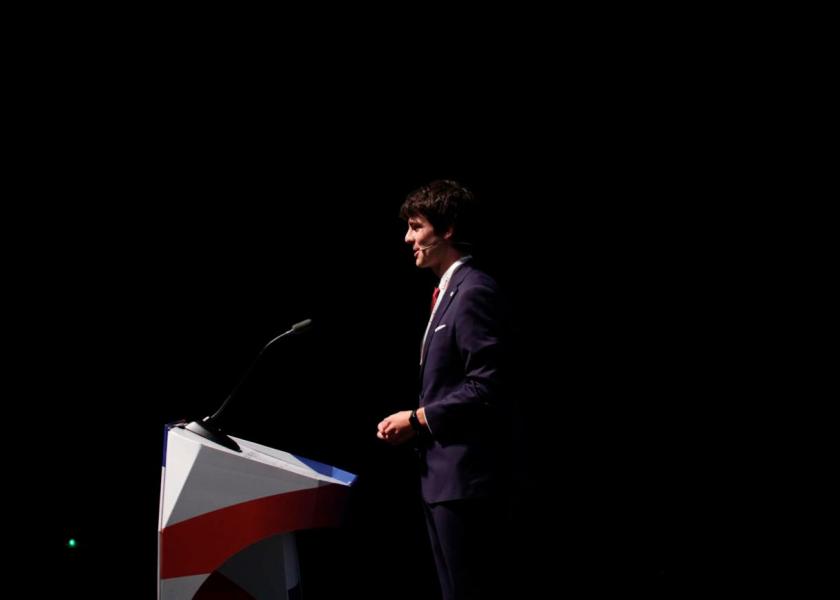Sarah Macías
Travelling through words

La palabra es una herramienta muy poderosa y debe usarse para tender puentes entre personas, culturas y comunidades. Eso es lo que hizo Sarah Macías durante el Mundial de Oratoria en Español para proclamarse campeona. En Melilla, esta jovencísima estudiante colombiana apeló a sus raíces y sus palabras se convirtieron en alas que transportaron al jurado desde la costa del Rif hasta el corazón del Valle del Cauca.
The first woman to win the World Universities Public Speaking Championship in Spanish—organized by the Spanish University Debate League (LEDU) and the Latin American University Cooperation Network (RLCU) with Iberia as the main sponsor—is an 18-year-old Colombian called Sarah Macías (Cali, 2007). A milestone this Social Communication and Journalism student at the Universidad Autónoma de Occidente in Cali (Colombia) feels particularly proud of because it is a way to defend the voices of women, especially those who have historically been silenced. Sarah won the final held on the 8th of October in Melilla against the Spaniard Rodrigo Sánchez-Bleda (Comillas Pontifical University), following the Spaniard Alberto García Chaparro. A victory she owes to her mother, who would record her giving speeches as a child, the speaker she prepared the competition with, Sandra Upegui, and the professor who encouraged her to take part, César Garzón.
In her last speech, titled La belleza de Colombia [The Beauty of Colombia], Sarah combined her heart and mind to build a bridge to her country through words and take the jury on a journey. This young speaker did not deny the misfortune her country has lived through, but highlighted its natural, cultural and human wealth to banish the stigmas that weight her down. “Take a good look at me. I am a woman, I am identity and I am a flag. I am Colombia. Are you going to listen to stereotypes or will you dare to discover such a beautiful country?” While unfurling a Colombian flag tied to her wrist, these were the parting words of a girl who describes herself as shy. Seeing her onstage, it is hard to believe. When you believe in what you say, everything is easier, Sarah assures us, which is why her defence of Colombia was so passionate, fascinating and believable.
Is public speaking an innate skill or something you can learn?
In my opinion, I think it can be both. Many people have the knack for speaking in public—they are fearless and their speech flows easily—, but it is also a skill that can be learnt. In fact, there are many courses that teach you how to speak in public. If you don’t have the knack for it, you can develop it gradually.
“I feel happy because I met one of my goals: to become a voice for all those voiceless women in the world”
Public speaking is much more than speaking well, right? What other aspects would you highlight?
Yes, for me, public speaking is much more than speaking well. There are many other aspects related to building a speech: what you want to say and how you are going to support it, its cohesion and coherence, its common thread… Your tone of voice and body language also matter, the way you say things to convince the audience. It is not just about speaking well, it means making sense of what you say and conveying that with your body.
As a child, you enjoyed recording yourself with your mother speaking to the camera; do you think that is where your talent for public speaking comes from?
Yes, I feel like the root for my passion for public speaking may come from those videos I used to record with my mother. Since I was a little girl, I have found it easy to speak in front of the camera, which is similar to speaking in front of an audience. In fact, I am studying Social Communication and Journalism, and I think that vocation also comes from those videos.

In the final phase, Sarah Macías came face-to-face against Rodrigo Sánchez-Bleda from Spain, Francesca Borelly from Panama and Andrea Machuca from Venezuela. © Courtesy of LEDU
How do you feel about being the first woman to win the World Universities Public Speaking Championship in Spanish?
It’s a huge deal! I feel proud for being the first, but above all I feel happy because I met one of my goals: to become a voice for all those voiceless women in the world. I was particularly excited to represent the women in my family there.
During your final speech, you defended your Colombian roots and gave them wings to move the Spanish audience present in Melilla. Did you want to give a different perspective of your country?
I love my country and, for me, speaking about it has always been very important. We cannot change history nor deny the negative aspects, which everybody already knows about. I wanted to give a different—more diverse, more beautiful—view of Colombia because we are much more than that and I don’t want people to have a reductionist perspective.
You dedicated your victory “to the dreamers who still believe that words can change things.” Which is the power of words?
The power of words is huge and can generate both positive and negative things. A positive use of words can change many people’s mindsets and improve the world, but a negative use could cause one of the greatest genocides in history, like during World War II. Words by themselves are important, but how we use them is even more important. We need to use them for good.
“Words by themselves are important, but how we use them is even more important. We need to use them for good”
In the post-truth era, is using supporting data essential for a public speaker?
When a speaker steps onstage to give a speech about a specific topic, they must use supporting facts, data, numbers, quotes. That is key and all good speakers should do this. It is not enough to say something with conviction; our assertions must be based on reality. This will lend you a lot of credibility and you will convey confidence to the audience.
You had less experience than your rivals, but you were calm and collected throughout. How did you achieve this?
I’m only 18 and I’m constantly learning. I still have so much to experience and so many things to learn. I think we all felt nervous during the final—me included—, but I believe that keeping calm in those moments is essential. I tried to remain calm and also convey that calmness to the audience. Knowing how to manage your emotions and not letting fear or anxiety take over is key to conveying credibility.

With a speech called ‘La belleza de Colombia’ [The Beauty of Colombia] and her country’s flag tied around her wrist, Sarah Macías convinced the jury. © Courtesy of LEDU
You describe yourself as a shy person; how do you convince yourself to step onstage?
When I step onstage, I do so to say something that I feel strongly about and want to convey. Sharing something that means a lot to me turns into a way of beating shyness. I can also feel insecure or scared, but I always manage to overcome those feelings and present myself as a convincing person during a competition. I believe that I have something relevant to say and there are people willing to listen.
How did you prepare for the World Public Speaking Championship? Was it hard to split your time between preparing and studying?
Preparing for the Championship was tough to do while studying because you have to steal time from absolutely everywhere: from your personal life, your studies, to practice… For the World Championship, I had to prepare six speeches and had to rush out of class to practice. I always receive support from many people: the university, my family, my classmates… Thanks to them, I met the goal: to win the World Championship.


